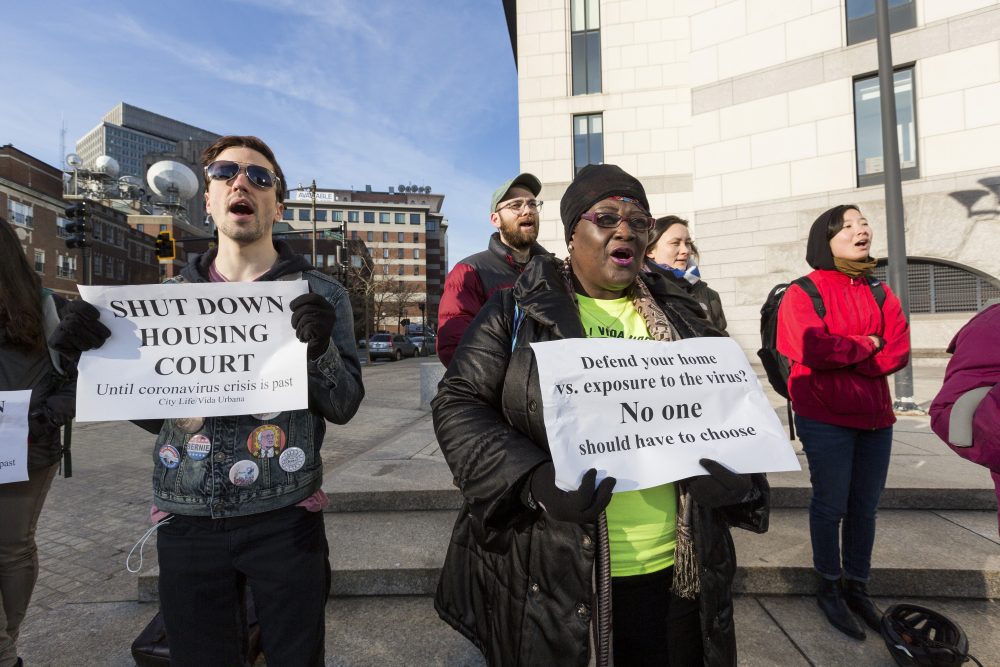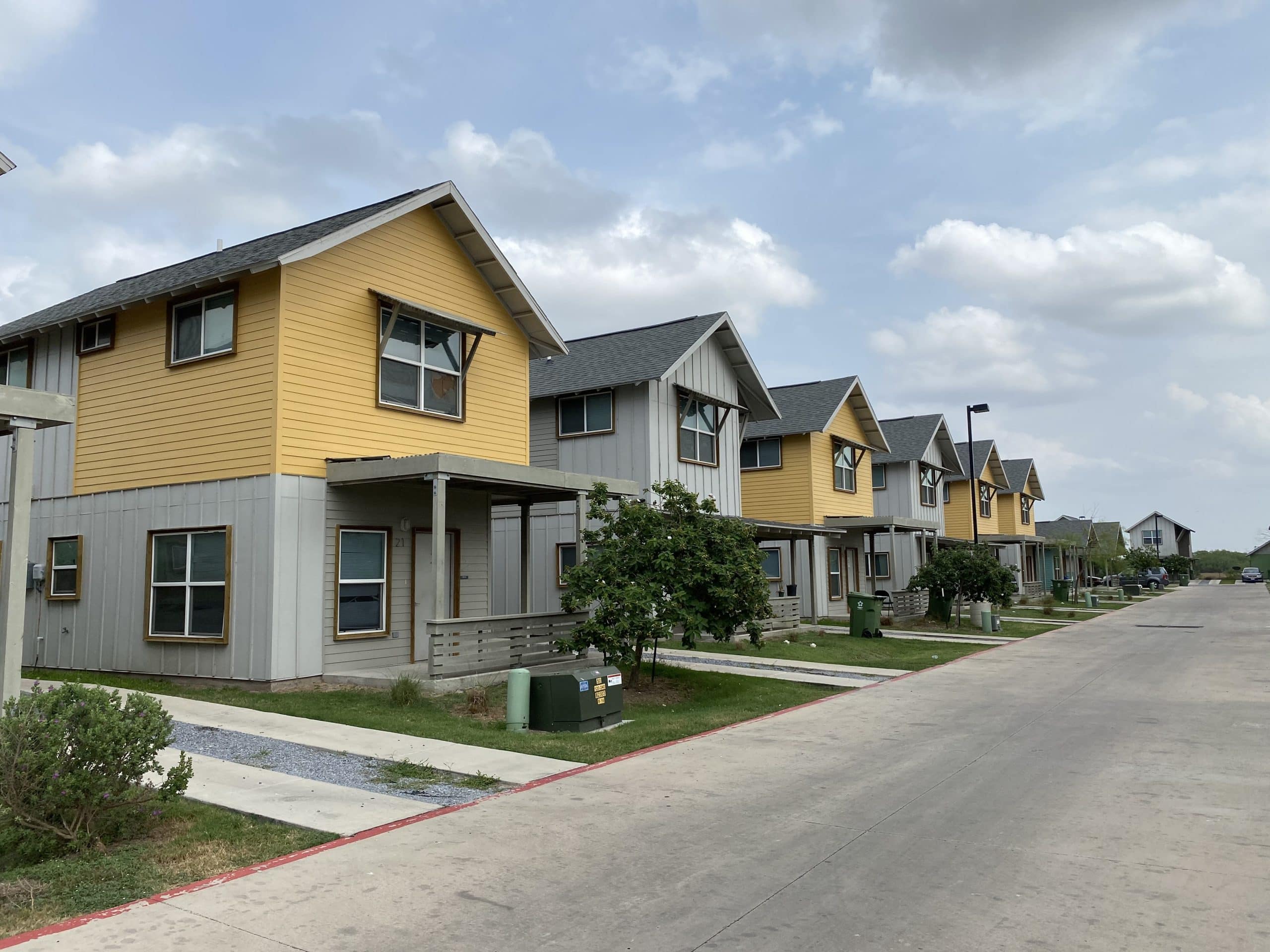
On March 12, in Boston, City Life/Vida Urbana activists held a rally outside the Edward Brooke courthouse to demand cancellation of eviction cases in housing court until the coronavirus crisis is over. “Housing court is one of the worst places to leave open if you want to prevent a spreading infection,” read the group’s statement. “All evictions except those by owner-occupants should be stayed.” Photo by Marilyn Humphries, humphriesphotography.com
Joe Kriesberg of the Massachusetts Association of Community Development Corporations (MACDC) recalls the feeling on Saturday, March 14, “the day the world changed”: the stock market plummeting, the National Basketball Association postponing their season. That week, tenant advocates across Boston—like City Life/Vida Urbana (CLVU)—started pushing for a moratorium on evictions, and affordable housing management groups began discussions about implementing a voluntary freeze of their own.
On that Saturday at 2 p.m., Mayor Martin Joseph Walsh’s office reached out to MACDC. The mayor and council had passed a home rule message last year petitioning the legislature for the ability to make decisions related to affordable housing for the city, but they had not yet received those powers. The situation had escalated and timing was urgent, and so they wanted to announce a voluntary moratorium on evictions, which was in their power to coordinate immediately.
Cities across the country are grappling with skyrocketing unemployment as residents are being urged to take shelter and avoid public places. In Jacksonville, Florida, evictions and foreclosures were placed on hold by a chief judge. In Miami-Dade County, the police department announced it would halt eviction enforcement. In New York, a chief administrative judge announced a halt to eviction hearings and evictions enforcement.
As with many of these jurisdictions, Boston’s response to the crisis created by COVID-19 evolved quickly and has played out in a variety of venues.
That Saturday, MACDC, activist groups, and some large affordable housing owners had some quick back and forth about what a voluntary eviction moratorium should look like. MACDC, for example, pushed to have an exception added: a stipulation that evictions of tenants endangering public health through conducting dangerous criminal activities, including domestic violence, could still be pursued. “We didn’t want something that was so locked down that we couldn’t deal with a situation,” says Kriesberg.
By 6 p.m. a deal was reached.
Details
Boston’s largest landlords of affordable housing—Trinity Financial, WinnCompanies, and The Community Builders—signed on to the 90-day moratorium on evictions. MACDC, a statewide membership organization of nonprofit housing organizations, signed on as well, encouraging all of its members to participate. The moratorium will be reviewed every 30 days.
But some of the details are still unclear. “Inherently, a voluntary freeze on evictions should be a great thing,” says Helen Matthews, communications director for City Life/Vida Urbana. However, Matthews was concerned about whether all evictions would be covered, or just those spurred by a COVID-19-related loss of income. CLVU remains confident that a comprehensive legislative solution would be better for tenants.
A statement by WinnCompanies CEO Gilbert Winn contains similar language: “We have instructed management staff to temporarily suspend implementing evictions for residents in our management portfolio across the Commonwealth in cases where a resident is unable to pay rent due to a loss of income.”
Asked for clarification as to whether their moratorium had to be COVID-19-related, Ed Cafasso of WinnCompanies said, “It applies to all eviction actions stemming from a loss of income.”
Kriesberg of MACDC, however, says he also supports a halt to evictions that were in process before the coronavirus pandemic, except for cases where public safety is at stake. “The people facing eviction from job losses sustained due to coronavirus have probably already paid the rent this month, but they haven’t paid April. But we don’t want to evict anyone right now, given the circumstances we all face. They shouldn’t get evicted.”
[Editor’s note: See “What an Effective Eviction Moratorium Must Include,” written by public interest lawyers, for a description of how to craft an effective moratorium.]
Other Landlords
The Massachusetts Apartment Association (MAA), whose members are primarily for-profit landlords and not limited to affordable housing, also indicated its support for the voluntary moratorium. “We understand the pressure residents are feeling during this crisis, and ensuring Bostonians have a safe, stable home is always our goal,” says Greg Vasil, CEO of the Greater Boston Real Estate Board, where the MAA is housed. Their recommendation is that the halting of evictions “apply to those who are directly impacted by economic loss due to the coronavirus outbreak.” MAA’s support means members are encouraged to follow these guidelines, but MAA can’t require its members to adhere to the advice. As of March 23 it was not mentioned on the organization’s COVID-19 resources page.
On Sunday, March 22, the National Multifamily Housing Council followed suit with its own recommendation that members voluntarily halt evictions for 90 days, and it called for a moratorium on mortgage payments and other financial obligations for apartment owners to make this possible.
But in Massachusetts, CLVU notes that some landlords have not signed on and have taken to posting language that seems intended to intimidate tenants into paying or moving out before any legislation may be passed that protects them, regardless of why they are unable to pay. For example, LaCourt Realty, based in Cambridge, Massachusetts, sent an email to its tenants on March 17 that read “CORONAVIRUS POLICY Please note that LaCourt Realty cannot permit any late rent payments from tenants due to the COVID-19 situation! (LaCourt has large mortgage payments due).”
Fannie Mae, Freddie Mac, and FHA have strongly encouraged lenders to forbear on mortgages if borrowers have loss of income related to COVID-19.
Moratorium in the Housing Courts
With the voluntary moratorium in place, housing advocates continue to press for more comprehensive action. Initially, momentum began building to get the housing courts to halt eviction hearings. A petition on the topic acquired 7,500 signatures early in March and a protest, organized by CLVU and other legal aid groups, was held inside the court on March 12. On March 14, Chief Justice Timothy Sullivan ordered the postponement of most eviction hearings until April 21.
Advocates, however, see problems with the order. They say it does not prevent the execution of evictions that have already gone through during a time when it is especially dangerous for families not to have a home. “People who have been evicted are waiting for the constable to show up to make them leave their home,” says Matthews of CLVU. “People with pre-existing executed evictions have [been given] 48 hours’ notice and they are waiting on pins and needles.”
Another concern is that Sullivan’s order suggests landlords and tenants should negotiate an agreement outside of court. “Legal services are operating at very attenuated resources right now,” says Matthews. “And we’re concerned people will enter into agreements that are bad for them. That they will agree to move out.”
Finally, Matthews says the moratorium on hearings simply doesn’t last long enough, given the circumstances.
A Legislative Answer?
Feeling the voluntary moratorium and the court moratorium were inadequate, advocates pivoted quickly to working with state representatives Mike Connolly and Kevin Honan on a legislative solution. “A moratorium on evictions and foreclosures will protect public health and safety by keeping vulnerable residents housed, thereby reducing crowding within the courts and in shelters,” said Connolly in a statement. “This will in turn limit further disruptions and additional strain on our already fractured social safety net and healthcare system. We have a responsibility to protect the most vulnerable and mitigate the impact of this pandemic, which is why Rep. Honan and I filed this legislation.”
The legislation would enact a statewide moratorium on evictions and foreclosures until the end of the governor’s declared state of emergency. The bill, HD. 4935, which currently has 60 cosponsors, was eligible to be voted on March 20, but representatives from Connolly’s office say it will likely go before a legislative task force on COVID-19 first, possibly by today, March 23, where advocates hope it will pick up even more support.
“Unfortunately, some landlord groups have predictably come out of the woodwork against it and there’s some incendiary language going on,” says Matthews. The organization Mass Landlords has published a top 10 reasons not to pass a moratorium, which claims that provisions of the proposed bill are “encouraging violence, harassment, and hate speech against housing providers and lenders.” They recommend a basic income guarantee instead.
“We are not blanketly trying to stop evictions,” says Matthews. “We need them to stop during this crisis so everyone can stay in their homes and shelter in place. We need to keep people out of places where they can be exposed, especially people with the least resources, who are the people who are facing evictions in this city.”
The Bill Will Come Due
Even with the moratorium and legislation, Kriesberg of MACDC says the bill will come due. The economic impact of the loss of rent could lead to deleterious effects on the entire housing system.
“The economic impact is going to last longer—a lot longer—than the pandemic,” he says. “If the pandemic lasts three months we might not really start to see the economic fallout until early next year. So we should not see any of the actions we’ve already taken as a substitute for the state to offer financial assistance, or as a replacement for philanthropy and assistance to renters. If we don’t want people evicted in the long run, someone has to come up with the money.”





Comments